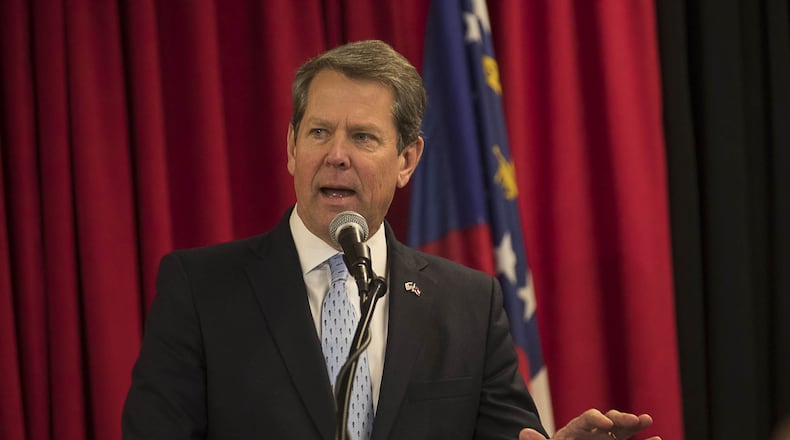Gov.-elect Brian Kemp struck a different tone Tuesday in his first major speech since his narrow victory, outlining an agenda focusing on boosting rural Georgia and small businesses that avoided talk of divisive social legislation.
The Republican aimed to distance himself from the attacks he unleashed during the campaign, urging the crowd of more than 100 legislators at the biennial training session in Athens that “it’s time to put politics behind us.”
“It’s time to shed the labels and work together as Georgians. It’s time to stand up for our communities, our families and our Georgia values,” he said. “It’s time to protect the vulnerable. It’s time to do the right thing — even when no one is looking.”
A small number of Democrats were eager to remind him of his cutting rhetoric during his campaign against Stacey Abrams by staging a boycott of his speech. But most Democrats attended the event, and several party leaders actively worked to avoid a larger walkout.
In the speech, Kemp didn’t announce a departure from his stance on issues such as his vow to expand gun rights and pledge to sign a “religious liberty” measure. But he sought to take a more conciliatory approach to the lawmakers he’ll need to pass his agenda.
He repeated previous campaign promises, such as an increase in teacher pay and a boost in rural hospital tax credits. And he outlined a new group, dubbed the Georgians First Committee, that will hash out ways to reduce regulations and boost small businesses.
Kemp also emphasized his plan to leverage more state resources to “crush” violent gangs and his plans to create a database that will track people in the country illegally who commit crimes, both standards of his campaign stump speech. He followed that up by reinforcing his pledge for $90 million to improve school safety.
“Our classrooms are for raising the next generation of Georgia leaders — not a hunting ground for school shooters,” he said.
‘Sick and tired’
This sort of shift is expected after a race decided by such a narrow margin. But it was no given — particularly because Kemp has sent mixed signals since his victory.
During the 10 days that fell between the election and when Abrams abandoned her bid, Kemp's campaign sent the same press releases attacking "radical" Democrats that it did before the vote.
And after Abrams ended her bid, Kemp followed his victory by pledging to carry out his conservative campaign vows and stocking his transition team with well-known Republicans.
But he also extended an olive branch to Atlanta Mayor Keisha Lance Bottoms — perhaps the state's most prominent Democratic official — by walking to City Hall last week to try to defuse tensions that erupted between the two over the summer.
For some Democrats, the softer tone from Kemp won’t be enough after he spent the past year railing against Abrams and her “radical backers” — and warned they wanted to take Georgia down a path toward socialism.
Several Democratic lawmakers pledged to boycott the event, saying they wouldn't forget his attacks and didn't want to lend legitimacy to him by attending his first address.
State Rep. Renitta Shannon invoked Kemp's handling of elections and his selfie with an anti-Muslim extremist in her decision to boycott the Republican's speech Tuesday at the legislative biennial conference. She said he ran a "campaign of hate" and that he can't walk it back now.
“I am sick and tired of conservatives across the country running hateful campaigns and then expecting everyone to go back to business as usual after campaign season,” said Shannon, a Decatur consultant.
But the party’s leaders have not joined that call, and several prominent Democrats discouraged others from taking part at a heated closed-door caucus meeting.
“If you’re not at the table, you might be on the menu,” said Democratic state Rep. Calvin Smyre, the longest-serving legislator in Georgia. “There can be some disagreement, and I’m sure there will be. But you can’t express that disagreement unless you participate.”
‘Olive branch’
The tight outcome — Abrams was within about 16,000 votes of forcing a runoff — left many Democrats infuriated that Kemp refused to resign as secretary of state and give up his role overseeing the state’s voting until after the election. Abrams refused to concede and launched a new voting rights group that filed a sweeping lawsuit seeking an overhaul of Georgia’s elections process.
Yet elected Democratic officials are in a bind, balancing their frustration with Kemp with the need to bring results for their constituents.
The party flipped more than a dozen legislative seats this year, and many of the newcomers will be targeted in 2020. Even those in solidly Democratic territory expressed concern about sending the wrong signal.
“You know, I fought real hard for Stacey Abrams. I was a big supporter of hers and still am,” said state Rep. Al Williams, D- Midway. “But I respect the office, and he’s going to be the governor the next four years. You don’t win all the time, and it’s time for the olive branch.”
Kemp echoed that theme throughout his address, highlighting areas where he believed both parties can reach a consensus, such as increased education funding and reduced business regulation.
“Campaigning is very tough. It’s very draining. It tests your faith some days, but it also tests your resolve. But governing is just as hard — or harder,” Kemp said. “And in the years ahead, there are times when we disagree. And that’s all right. But there are many more times when we agree, and we unite to lead this state.”
Stay on top of what’s happening in Georgia government and politics at ajc.com/politics.
About the Author
Keep Reading
The Latest
Featured




